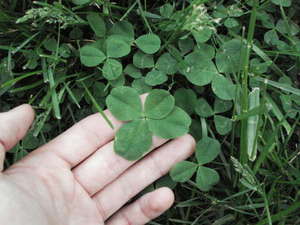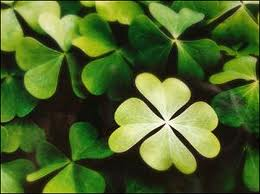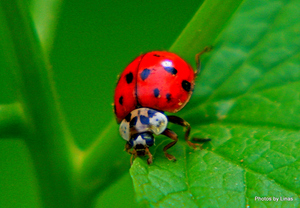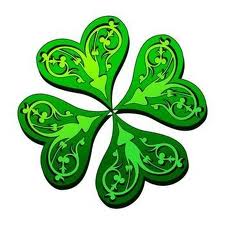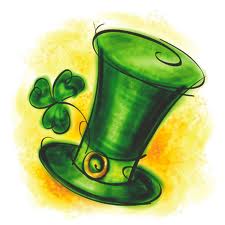Some Symbolic Meaning and Legends of Clovers:
The four-leafed Clover, possibly because it is relatively rare, has been a Symbol of Good Luck for centuries. According to tradition, one leaf brings fame; one brings wealth; another insures good health; and the fourth, a faithful lover.
When Adam and Eve were expelled from Paradise, Eve took along a souvenir in the form of a four-leafed Clover. It remained with her as a reminder of her happy days in the Garden of Eden. For generations of people, finding one in their own garden brought the same kind of happiness. So, if you are lucky enough to find one, you are actually holding on to something from paradise.
Another tradition says that a four-leafed Clover stands for the arms of the cross, a powerful symbol even in pre-Christian times. It is also significant to many that the four leaves describe the points of the compass. Some cultures have believed that four-leafed Clovers can prevent madness.
Although almost all Clovers are considered lucky, Irish legend has it that the four-leafed Clover is the ultimate defense against black magic. Legend also says that a young woman who places one in her left shoe will marry the first man she meets afterwards.
Giving or receiving a Clover is considered "lucky" all in itself, probably due to its mystical and spiritual associations. In folk magic, Clovers have been used to protect one from evil, to help with financial trouble, to assist with broken hearts, to find new loves, to attract money, and more. Growing Clover on your property is also said to keep snakes away.
But what of the history behind four leaf clovers being considered lucky charms? Since the operative number here is four, the history behind four leaf clovers as lucky charms is clearly distinct from the Trinitarian tradition behind the shamrock. Indeed, the significance invested in four leaf clovers pre-dates Christianity, going back to the pagan period, when four leaf clovers were Celtic charms. Celtic dominance once extended across Ireland and much of Western Europe. It was the Druids (Celtic priests) who elevated four leaf clovers to the status of Celtic charms, allegedly potent against malevolent spirits. Their status as Celtic charms is the origin of the modern belief in their power to bestow good luck. The leaves of four leaf clovers are sometimes also said to stand for faith, hope, love, and luck.
President Abraham Lincoln carried a four-leaf clover most of his life. It is said that one of the few times he did not have the clover in his pocket was when he went to the theater on Apr 14, 1865, when he was assassinated.
The four-leafed Clover, possibly because it is relatively rare, has been a Symbol of Good Luck for centuries. According to tradition, one leaf brings fame; one brings wealth; another insures good health; and the fourth, a faithful lover.
When Adam and Eve were expelled from Paradise, Eve took along a souvenir in the form of a four-leafed Clover. It remained with her as a reminder of her happy days in the Garden of Eden. For generations of people, finding one in their own garden brought the same kind of happiness. So, if you are lucky enough to find one, you are actually holding on to something from paradise.
Another tradition says that a four-leafed Clover stands for the arms of the cross, a powerful symbol even in pre-Christian times. It is also significant to many that the four leaves describe the points of the compass. Some cultures have believed that four-leafed Clovers can prevent madness.
Although almost all Clovers are considered lucky, Irish legend has it that the four-leafed Clover is the ultimate defense against black magic. Legend also says that a young woman who places one in her left shoe will marry the first man she meets afterwards.
Giving or receiving a Clover is considered "lucky" all in itself, probably due to its mystical and spiritual associations. In folk magic, Clovers have been used to protect one from evil, to help with financial trouble, to assist with broken hearts, to find new loves, to attract money, and more. Growing Clover on your property is also said to keep snakes away.
But what of the history behind four leaf clovers being considered lucky charms? Since the operative number here is four, the history behind four leaf clovers as lucky charms is clearly distinct from the Trinitarian tradition behind the shamrock. Indeed, the significance invested in four leaf clovers pre-dates Christianity, going back to the pagan period, when four leaf clovers were Celtic charms. Celtic dominance once extended across Ireland and much of Western Europe. It was the Druids (Celtic priests) who elevated four leaf clovers to the status of Celtic charms, allegedly potent against malevolent spirits. Their status as Celtic charms is the origin of the modern belief in their power to bestow good luck. The leaves of four leaf clovers are sometimes also said to stand for faith, hope, love, and luck.
President Abraham Lincoln carried a four-leaf clover most of his life. It is said that one of the few times he did not have the clover in his pocket was when he went to the theater on Apr 14, 1865, when he was assassinated.

Arabic: Hathan mwafakan
Basque: Zorte on
Bargoens: De Mazzel en de Brogus
Catalaans: Bona sort
Croatian: Sretno
Danish: Held og lykke
Dutch: Veel Geluk
Farsi: Movaffagh Baashid
Finnish: Onnea!
French: Bonne chance
German: Viel Glück or Alles Gute
Greek: Kali tihi
Gujarat: Subh Labh
Hawaiian: Maika'i Pomaika'i
Hebrew: B'hatzlacha
Hindi: Shubh Kamnaye
Hungarian: Sok szerencsét!
Indonesian: Semoga Beruntung!
Irish: Go n'éirí an t-ádh leat
Italian: Buona fortuna
Jewish: Mazzeltov
Japanese: Gambatte
Lithuanian: Sekme's
Mandarin: Zhu ni hao yun
Marathi: Shubhecha
Nederlands: Veel geluk
Norwegian: Lykke til
Polish: Powodzenia!
Portugese: Boa sorte
Romanian: Noroc Mult
Russian: Udachi
Serbian: Srecno
Spanish: Buena suerte
Slovenian: Mnogo srece
Swedish: Lycka till!
Szczescia: Zycze Ci
Tamil: Nal Vazalthukal
Thai: โชคดี (chok dee)
Turkish: Lyi sanslar
Welsh: Hawddamor
Zulu: Ngikufisela iwela


